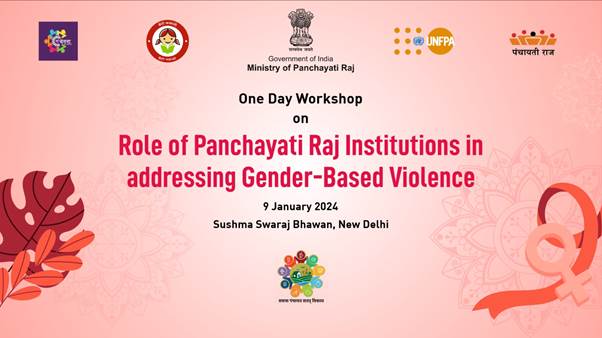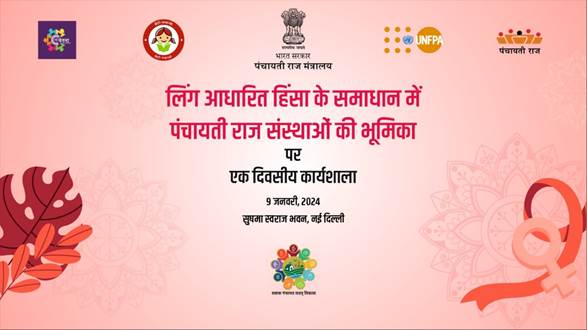Giriraj Singh to Inaugurate National Workshop on Panchayati Raj’s Role in Combating Gender-Based Violence on January 9th, 2024, in New Delhi
Shri Giriraj Singh, Union Minister for Rural Development and Panchayati Raj will inaugurate the one-day National Workshop virtually on Role of Panchayati Raj Institutions in Addressing Gender-Based Violence (GBV) on 9thJanuary 2024 at New Delhi. The workshop is being organized by the Ministry of Panchayati Raj in collaboration with UNFPA (United Nations Population Fund) India.
The objective of the workshop is to discuss the role of Elected Representatives of PRIs in mitigating and addressing the issues related to GBV and spread awareness among the State Panchayati Raj Department, NIRD&PR, SIRD&PRs, Panchayati Raj Training Institutions and Panchayats. The workshop covers the sensitive issues like Child Marriage, Human Trafficking, Sexual Abuse, Domestic Violence etc. The Workshop aims to deepen understanding and enhance collective efforts in addressing gender-based violence (GBV). By covering key areas related to GBV, participants will gain insights into prevention strategies, support mechanisms, and the importance of fostering a culture of respect and equality.

Shri Giriraj Singh will address the inaugural session. Shri Vivek Bharadwaj , Secretary, Ministry of Panchayati Raj, Shri Shailesh Kumar Singh, Secretary, Department of Rural Development, Dr. Chandra Shekhar Kumar, Additional Secretary, Ministry of Panchayati Raj, Shri Vikas Anand, Joint Secretary, Ministry of Panchayati Raj and Ms. Andrea M. Wojnar, Resident Representative, UNFPA India will also address the inaugural session. Senior officers of State and UT Departments of Panchayati Raj, SIRD&PRs, elected women representatives of Panchayati Raj Institutions, functionaries and other stakeholders will also participate in the day-long workshop.A Handbook for Elected Representatives– Panchayats Free From Gender-Based Violence will be released virtually by Shri Giriraj Singh on this occasion.
Focus areas to be highlighted during the inaugural session include-
- Role of UNFPA in Capacity Building of PRIs in addressing the issues related to Gender Based Violence
- Strengthening Institutional Efforts to address GBV at Grassroots Level
- Role of Community Based Organisations (CBOs) /Self-Help Groups (SHGs) in addressing the GBV
- Promoting Community based initiatives to prevent Gender-Based Violence (GBV)
Panchayati Raj Institutions / Rural Local Bodies play a pivotal role in fostering social change and addressing such challenges. This workshop will bring together key stakeholders, including elected representatives of Panchayati Raj Institutions / Rural Local Bodies, policymakers, CBOs/ NGOs, and thematic experts, to deliberate on strategies for leveraging Panchayati Raj institutions to effectively tackle gender-based violence.
Senior officers of the Ministry of Rural Development, Ministry of Women and Child Development, Ministry of Home Affairs, National Crime Records Bureau (NCRB) and representatives of PRADAN (Professional Assistance for Development Action), TRIF (Transforming Rural India Foundation) and other stakeholders will be participating during the Workshop.
The key issues such as Role of Panchayati Raj Institutions/Community Based Organisations in addressing Gender-Based Violence, Addressing Gender-Based Violence by Involving Civil Society Organisations at the grassroots level, Role of Panchayati Raj Institutions in addressing issues related with Women and Girl Child Trafficking at Grassroots,Role of Elected Representatives of Panchayats in Mitigating and Addressing the issues related to Gender-based Violence at the Grassroots will be discussed during the day-long Workshop.
The Workshop will help advancing the concerted efforts on Women-Friendly Panchayat theme of Localization of Sustainable Development Goals (LSDGs), which is a crucial and pioneering step taken by the Ministry of Panchayati Raj towards achieving sustainable and inclusive development at the grassroots level. By empowering women leadership in grassroots governance, addressing gender disparities and gender-based violence, and implementing targeted initiatives, rural communities can create a more equitable and resilient future for all. The success of these efforts depends on the collective commitment of stakeholders to champion the cause of women’s empowerment and Localization of Sustainable Development Goals.

Background: –
India is a signatory to various International Conventions and Treaties, including Convention on Elimination of All forms of Discrimination against Women (CEDAW-1979) and Convention on the Rights of the Child (CRC-1989). India has also committed to the 2030 development agenda and the attainment of the Sustainable Development Goals. Efforts are hence being made to promote gender equality across communities and society. Ministry has adopted a thematic framework to frame the agendas and policies to attain the SDGs by 2030 through building the capacity of Panchayati Raj Institutions.
Localization of Sustainable Development Goals (LSDGs) Theme 9: Women Friendly Village aims to ensure protection, safety, economic & inclusive growth & social development for women and girl children. Gender-based plan will ensure gender justice and promote gender equality; address discriminatory social norms and practices, enhance the values of women & girls; which will definitely support to achieve the SDG 5.
Gram Panchayat Development Plan incorporating village action plans /flagship schemes of different line departments for rural-centric socio-economic interventions being implemented with and through Gram Panchayat.
Role of PRIs in addressing Gender Based Violence:
- Preparation of Women Friendly Plan integrating all available resources through convergence
- Promote Legal Literacy and Counseling Services and legal Aids to vulnerable /marginalized people
- Organize Mahila Sabha to address the issues of women & girls and ensure women’s participation in decision-making process
- Promote skill development and livelihood opportunities for women
- Leadership Training Program for Elected Women Representatives
- Create safe spaces for women and girls through safety audits
- Integration of women’s issues in GPDP to ensure Gender Based Plan
- Strengthen the PRI-CBO Convergence through integrating multi-sectoral activities

